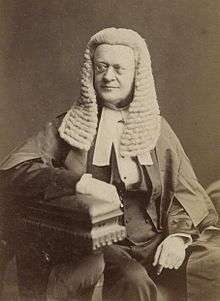William Bovill
| The Right Honourable Sir William Bovill QC, PC | |
|---|---|
 Bovill in 1872 | |
| Chief Justice of the Common Pleas | |
| Personal details | |
| Born |
26 May 1814 Allhallows, Barking |
| Died |
1 November 1873 (aged 59) Kingston upon Thames |
Sir William Bovill PC QC FRS (26 May 1814 – 1 November 1873) was an English lawyer, politician and judge. He served as Chief Justice of the Common Pleas between 1866 and his death in 1873.
Background
Bovill was born at Allhallows, Barking, a younger son of Benjamin Bovill, of Wimbledon, London.[1]
Career
On leaving school, Bovill did not go to university but was articled to a firm of solicitors. He entered the Middle Temple and practised for a short time as a special pleader below the bar. He was called to the bar in 1841 and joined the home circuit. His special training in a solicitor's office, and its resulting connection, combined with a thorough knowledge of the details of engineering, acquired through his interest in a manufacturing firm in the east end of London, soon brought him a very extensive patent and commercial practice.[1]
Bovill became a Queen's Counsel (QC) in 1855, and on 28 March 1857 was elected Member of Parliament (MP) for Guildford. In the House of Commons, he was very zealous for legal reform, and the Partnership Law Amendment Act 1865, which he helped to pass, is always referred to as Bovill's Act. In 1866, he was appointed Solicitor General, an office which he vacated on becoming Chief Justice of the Common Pleas in succession to Sir William Erle in November of the same year.[1]

Personal life
Bovill had married, in 1844, Maria Bolton, eldest daughter of John Henry Bolton of Lee Park, Blackheath. They lived firstly in London and then moved to Worplesdon, where they made their home at Worplesdon Lodge (later renamed Worplesdon Place). One of his sons, Elliot Bovill became Chief Justice of Cyprus and the Straits Settlement.
He died at Kingston upon Thames on 1 November 1873. Maria, Lady Bovill died in London 21 October 1901.[2]
Honours
Bovill was knighted in 1866. In May 1867 he was elected a Fellow of the Royal Society.[3]
References
- 1 2 3 Chisholm 1911.
- ↑ "Obituary - Maria, Lady Bovill". The Times (36593). London. 23 October 1901. p. 7.
- ↑ "Bovill; Sir; William (1814 - 1873)". Royal Society. Retrieved 18 December 2010.
- Attribution
 Chisholm, Hugh, ed. (1911). "Bovill, Sir William". Encyclopædia Britannica (11th ed.). Cambridge University Press.
Chisholm, Hugh, ed. (1911). "Bovill, Sir William". Encyclopædia Britannica (11th ed.). Cambridge University Press.
External links
| Wikimedia Commons has media related to William Bovill. |
 Hamilton, John Andrew (1886). "Bovill, William". In Stephen, Leslie. Dictionary of National Biography. 6. London: Smith, Elder & Co. pp. 38–39.
Hamilton, John Andrew (1886). "Bovill, William". In Stephen, Leslie. Dictionary of National Biography. 6. London: Smith, Elder & Co. pp. 38–39. - Hansard 1803–2005: contributions in Parliament by Sir William Bovill
| Parliament of the United Kingdom | ||
|---|---|---|
| Preceded by James Bell Ross Donnelly Mangles |
Member of Parliament for Guildford 1857–1866 With: Ross Donnelly Mangles to 1858 Guildford Onslow from 1858 |
Succeeded by Richard Garth Guildford Onslow |
| Legal offices | ||
| Preceded by Sir Robert Collier |
Solicitor General 1866 |
Succeeded by Sir John Burgess Karslake |
| Preceded by Sir William Erle |
Chief Justice of the Common Pleas 1866–1873 |
Succeeded by The Lord Coleridge |